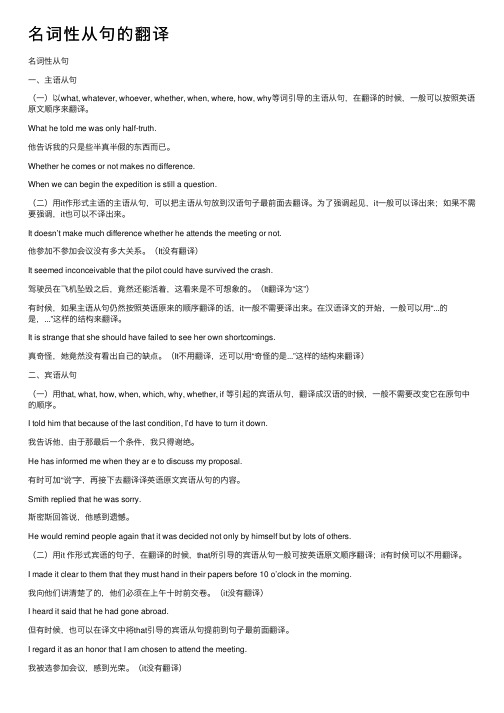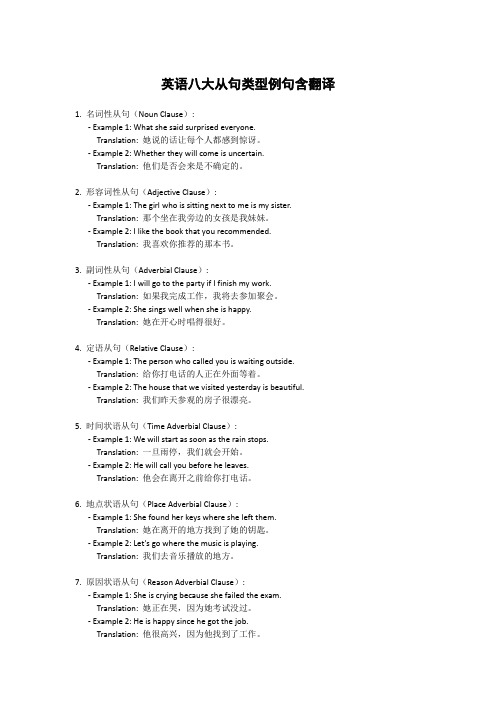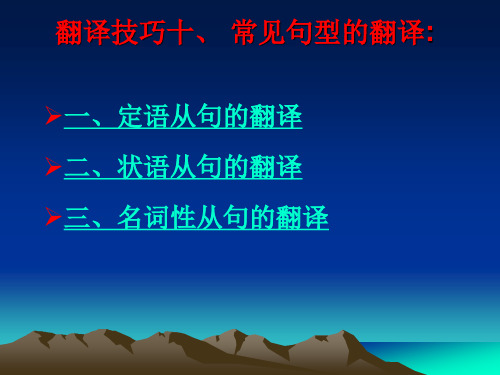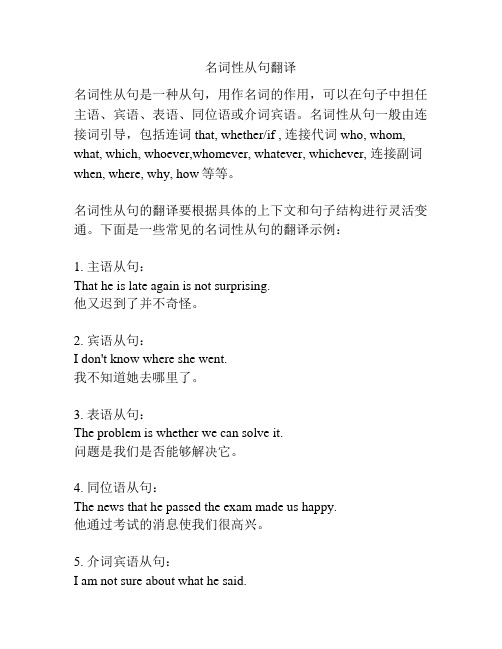6 名词性从句的译法
名词性从句的翻译

名词性从句的翻译名词性从句⼀、主语从句(⼀)以what, whatever, whoever, whether, when, where, how, why等词引导的主语从句,在翻译的时候,⼀般可以按照英语原⽂顺序来翻译。
What he told me was only half-truth.他告诉我的只是些半真半假的东西⽽已。
Whether he comes or not makes no difference.When we can begin the expedition is still a question.(⼆)⽤it作形式主语的主语从句,可以把主语从句放到汉语句⼦最前⾯去翻译。
为了强调起见,it⼀般可以译出来;如果不需要强调,it也可以不译出来。
It doesn’t make much difference whether he attends the meeting or not.他参加不参加会议没有多⼤关系。
(It没有翻译)It seemed inconceivable that the pilot could have survived the crash.驾驶员在飞机坠毁之后,竟然还能活着,这看来是不可想象的。
(It翻译为“这”)有时候,如果主语从句仍然按照英语原来的顺序翻译的话,it⼀般不需要译出来。
在汉语译⽂的开始,⼀般可以⽤“...的是,...”这样的结构来翻译。
It is strange that she should have failed to see her own shortcomings.真奇怪,她竟然没有看出⾃⼰的缺点。
(It不⽤翻译,还可以⽤“奇怪的是...”这样的结构来翻译)⼆、宾语从句(⼀)⽤that, what, how, when, which, why, whether, if 等引起的宾语从句,翻译成汉语的时候,⼀般不需要改变它在原句中的顺序。
名词性从句的翻译

名名词词性性从从句句的的翻翻译译英语名词从句包括主语从句、宾语从句、表语从句和同位语从句等。
翻译这类从句时,大多数可按原文的句序译成对应的汉语,但也还有一些其它的处理方法。
现分述如下:一、主语从句(一) 以what, whatever, whoever 等代词引导的主语从句翻译时一般可按原文顺序翻译。
1) What he told me was only half-truth.他告诉我的只是些半真半假的东西。
2) Whatever he saw and heard on his trip gave him a very deep impression.他此行所见所闻都给他留下了深刻的印象。
3) Whoever has made a voyage up the Hudson must remember the Kaatskill Mountains.凡是在哈得孙河上游航行过的人是一定记得卡兹吉尔群山的。
他告诉我的只是些半真半假的东西而已。
(二)以it 作假主语所引出的真主语从句,翻译时视情况可以提前,也可以不提前。
1. 真主语从句提前译,为了强调起见,it 一般可以译出来,如果不需要强调,it 也可以不译出来。
1)It doesn’t m ake much difference whether he attends the meeting or not . 他参加不参加会议没有多大关系。
2)It is a fact that the U .S .S .R .has sent it fleet to all parts of the world. 苏联已把它的舰队派往世界各地,这是事实。
3)It seemed inconceivable that the pilot could have survived the crash . 驾驶员在飞机坠毁之后,竟然还能活畜,这看来是不可想象的。
2.真主语从句不提前,it 一般不需要译出来。
句子翻译 (2)

宾语从句的译法
(1) 翻译宾语从句一般都用顺译法 • I can’t make out what they are talking about. 我不清楚他们在谈什么。 • He was not conscious of what an important discovery he had made. 他没意识到他的这一发现多么重要。 • We are certain that we’ll be able to accomplish the designing in a short period of time. 我们肯定能在短期内完成这项设计。
(2) 用倒译法将同位语从句译为前置修饰语 • There was little probability that they would succeed. 他们成功的可能性极小。 (3) 用转换法将同位语从句转译为汉语的复合 结构作宾语 • This thought came to him that maybe he had left his keys in the bedroom. 他突然想起可能把钥匙忘在卧室里了。
同位语从句的译法
(1) 用顺译法将同位语从句译为汉语的独立句,并根 据具体情况在前面加冒号、破折号或加“即”等 表同位关系的词 • Then arose the question where we were to get the materials needed. 于是就产生了这样一个问题:我们到哪里去找所需 要的材料。 • The name “volcano” indicates the belief of the ancient Greeks that the burning hills of the Mediterranean were the workshops of divine blacksmith, Vulcan. “火山”这一名称表明古希腊人的这一信念,即地中 海沿岸燃烧着的山是锻冶之神“伍尔坎”的工场。
英语八大从句类型例句

英语八大从句类型例句含翻译1. 名词性从句(Noun Clause):- Example 1: What she said surprised everyone.Translation: 她说的话让每个人都感到惊讶。
- Example 2: Whether they will come is uncertain.Translation: 他们是否会来是不确定的。
2. 形容词性从句(Adjective Clause):- Example 1: The girl who is sitting next to me is my sister.Translation: 那个坐在我旁边的女孩是我妹妹。
- Example 2: I like the book that you recommended.Translation: 我喜欢你推荐的那本书。
3. 副词性从句(Adverbial Clause):- Example 1: I will go to the party if I finish my work.Translation: 如果我完成工作,我将去参加聚会。
- Example 2: She sings well when she is happy.Translation: 她在开心时唱得很好。
4. 定语从句(Relative Clause):- Example 1: The person who called you is waiting outside.Translation: 给你打电话的人正在外面等着。
- Example 2: The house that we visited yesterday is beautiful.Translation: 我们昨天参观的房子很漂亮。
5. 时间状语从句(Time Adverbial Clause):- Example 1: We will start as soon as the rain stops.Translation: 一旦雨停,我们就会开始。
考研英语翻译之名词性从句的翻译

Whether an organism is a plant or an animal sometimes taxes the brains of a biologist.
一种生物是植物还是动物,有时使生物学家很伤脑筋。
When it was first invented is not known.
众所周知,物体在水中比在空气中轻。
It is no longer a question whether man can fly to the moon.
人能否飞上月球,现在已不再是什么问题了。
It is certain that we shall produce this kind of engine.
宾语从句既可以是动词的宾语,也可以是某些形容词或介词的宾语。宾语从句也可以出现在由it作形式宾语的句子中,汉译时,顺序一般不变。例如:
Scientists have long predicated that computers would one day help speed up the arduous task of translating texts.
The suggestion that we should develop the natural resources in this region has been discussed.
关于我们应该开发本地区自然资源的建议已经被讨论过了。
There is no possibility that human beings will ever be controlled by robots.
问题在于人们怎样才能找到一种有效的方式来储藏太阳热。
翻译技巧 常见句型的翻译

6. He liked his sister, who was warm and pleasant, but he did not like his brother, who was aloof冷漠 and arrogant高傲.
他喜欢热情愉快的妹妹,而不喜欢冷漠高傲的哥哥。
II . 译成后置定语
这是我第一次和领导发生严重纠葛。
IV. 译成状语
有些定语从句从形式上看是定语,但在意义上与主 句有逻辑状语关系,对主句其原因、结果、目的、条件、 让步等状语作用,翻译时应尽可能按照其语法功能,译 成与汉语相对应的复句。
21. The computer, which seems to play the role of a human brain, is often called an electronic brain.
据我所知, 英语里并没有这个单词。
状语从句的翻译
3. Where water resources are plentiful, hydroelectric power stations are being built in large numbers. 哪里有充足的水源,哪里就在兴建大批的水电站。 4. Wherever you work, you must always serve the
unfair.
他把一切错误都归罪于我,我认为这很不公平。
12. These books, which are only a small part of my
collection, I picked up in American.
这些书是我在美国买,它们在我的藏书中只占一小部
分。
13. She was very patient towards the children,
名词性从句翻译

名词性从句翻译名词性从句是一种从句,用作名词的作用,可以在句子中担任主语、宾语、表语、同位语或介词宾语。
名词性从句一般由连接词引导,包括连词that, whether/if , 连接代词who, whom, what, which, whoever,whomever, whatever, whichever, 连接副词when, where, why, how等等。
名词性从句的翻译要根据具体的上下文和句子结构进行灵活变通。
下面是一些常见的名词性从句的翻译示例:1. 主语从句:That he is late again is not surprising.他又迟到了并不奇怪。
2. 宾语从句:I don't know where she went.我不知道她去哪里了。
3. 表语从句:The problem is whether we can solve it.问题是我们是否能够解决它。
4. 同位语从句:The news that he passed the exam made us happy.他通过考试的消息使我们很高兴。
5. 介词宾语从句:I am not sure about what he said.我不确定他说的是什么。
6. 间接引导名词性从句:He asked where I lived.他问我住在哪里。
7. 是否从句:I wonder whether/if she will come to the party.我想知道她是否会来参加派对。
8. 选择性从句:He asked me whether I preferred coffee or tea.他问我是喜欢咖啡还是茶。
9. 宾语从句(陈述句变为疑问句):Do you know what time it is?你知道现在几点钟吗?10. 宾语从句(连接代词):I wonder who is going to pick us up at the airport.我想知道谁会在机场接我们。
英语从句翻译方法

英语从句翻译方法-CAL-FENGHAI.-(YICAI)-Company One1英语从句翻译方法英语多从句,汉语多分句:就句子类型而言,英语句子不仅可以在简单句中使用很长的修饰语使句子变长,同时也可以用从句使句子变复杂,而这些从句往往通过从句引导词与主句或其它从句连接,整个句子尽管表面上看错综复杂却是一个整体。
汉语本来就喜欢用短句,加上表达结构相对松散,因此,英译汉时需要将各种英语从句进行处理,可以译成一个汉语单句,也可译成多个汉语分句。
并按照汉语的表达习惯对英语复合句的关联部分(从句引导词)加以逻辑梳理,既分而叙之,又上关下联,承接转换,犹如整容。
一名词性从句的译法名词性从句包括主语从句、宾语从句、表语从句和同位语从句。
下面我们便逐一论述这些名词性从句的翻译方法。
1. 主语从句1) 由what, whatever, whoever等代词引导的主语从句汉译时一般可按原文顺序翻译。
例如:What he said is true.译文:他说的一切都是真的。
Whoever violates the disciplines should be criticized.译文:谁违犯了纪律,谁就应该受到批评。
2) 由it作形式主语引导的主语从句,翻译时视情况可以提前,也可以不提前。
例如:It doesn't make much difference whether you come yourself or send a substitute.译文:你是自己来还是派代理人来,都无关紧要。
(提前)It seemed inconceivable that the pilot could have survived the crash.译文:驾驶员在飞机坠毁之后竟然还活着,这看来是不可想象的。
(提前)It is strange that she should have failed to see her own shortcomings.译文:这奇怪,她竟然没有看出自己的缺点。
- 1、下载文档前请自行甄别文档内容的完整性,平台不提供额外的编辑、内容补充、找答案等附加服务。
- 2、"仅部分预览"的文档,不可在线预览部分如存在完整性等问题,可反馈申请退款(可完整预览的文档不适用该条件!)。
- 3、如文档侵犯您的权益,请联系客服反馈,我们会尽快为您处理(人工客服工作时间:9:00-18:30)。
主语从句译法 What
the students find most difficult
in English is its idiomatic usage.
学生感到,
英语最困难的地方是
它的习惯用法。
主语从句译法 Whether
he comes or not makes no
difference.
through the crisis of his illness. 我担心他是否能渡过疾病的危险期。
Smith
replied that he was sorry.
史密斯回答说,他感到遗憾。
宾语从句翻译 用 it 作形式宾语的句子,汉译时
that引起的宾语从句一般可按照原 文顺序,it不译。 I take it for granted that you will come and talk the matter over with him. 我想你会来跟他谈这件事的。
whtever;whoever;whichever;
when; where; how; why;
宾语从句翻译 宾语从句翻译顺序可顺可逆,比较
灵活,具体视情况确定。
Can
you hear what I say?
你听得到我所讲的吗?
宾语从句翻译 I
worry about whether he can pass
主语从句译法
It is quite obvious that the girl still loves you deeply. It is an honor that I was invited to attend your marry ceremony.
很明显,这个女孩依然深爱着你。
很荣幸,被邀请参加你的婚礼。
why;whether; whoever; whatever; whichever;
主语从句译法 T h a t
he finished writing the
composition in such a short time
surprised us all.
他在这么短的时间内写完一篇作文
使我们都感到惊讶。
was how a small nation won
the victory over a big power.
这就是小国如何战胜大国的。
就这样,小国战胜了大国。
同位语从句翻译 英语的同位语从句是用以解释说
明前面某一名词的内容的,也就是
将这一名词的含义具体化,其地位
和此名词是同等的。
从句常用 that 或 whether 来引导。
It
is a fact that everyone wants to have a
good job.
事实上,每个人都想有份好工作。
注意:该句是主语从句而不是同位语 从句。同位语从句应做与fact同等成分、 同等意义的成分,如: The fact that everyone wants to have a good job is true.
上世纪末有一个重要的发现,即一切
东西都有一部分是由电子构成的。
同位语从句翻译
有需要时,同位语从句也可提前:
There
can be no doubt that she is competent for this job.
她能胜任这项工作,这是毫无疑
问的。
同位语从句翻译 This
is a certainty that socialism will replace capitalism.
同位语从句与其所修饰的名词之间是一种 同位关系,二者之间存在逻辑上的系表关 系,可用“主+系+表”结构来表示。
• The news that she will go abroad is true. •她将出国这消息是真的。
The news is that she will go abroad
同位语从句翻译
德国已对俄国宣战的消息一大早
就传来了。
同位语从句翻译
将同位语从句翻译成宾语: He expressed the hope that he would come over to visit China again. 他表示希望再到中国来访问。
I had no idea that you were here.
is/was
+
名词
被动语态
+ that 从句
行为动词
补语
主语从句译法 1.真主语从句不提前,按正常语序,
it 不翻译出来:
It
is strange that she should have failed to see her own shortcomings.
真奇怪,她竟然没看出自己的缺点。
社会主义将代替资本主义,这是
必然的事。
主句在后,并用“这”重复指代主 语从句内容 It seemed unbelievable that the pilot could have survived the crash. 驾驶员在飞机坠毁之后,竟然还 能活着,这看来是不可想象的。
宾语从句翻译 宾语从句在句中作宾语,引导词为
that;who;what;which;if/whether;
主语从句译法 该种名词性从句有时需要颠倒主句
和从句顺序来使译文更加通顺,如:
It's
a sheer waste of time that we read such kind of trash.
时间。
阅读这样的垃圾图书简直就是浪费
主语从句译法 It
is+ 被动语态 +that 从句常有固 is reported that the Summit
名词性从句译法
英语名词性从句包括主语从句、宾
语从句、表语从句和同位语从句。
在翻译时,词序一般不变,但有时
也需采取一些其他处理方法。
主语从句 宾语从句
表语从句
同位语从句
主语从句译法
主语从句的位置:
1.句首
2.It(形式主语)+谓语动词+主语从句
主语从句的引导词: that;what;who;which;when;where; how;
Page35、37
页。
主语从句译法 It+行为动词+that从句 一般按正常语序译出即可,it不翻
译出来 It occurred to me that he had forgotten to lock the door. 我突然想起他忘了锁门。(课本原
句)
主语从句译法 也可拆成两部分,主语从句在前,
我不知道你也在这儿。
同位语从句翻译
将从句翻成同位语,用“即”,“这” 或者 “破折号”过渡:
At
the end of last century,an important
discovery was made that everything was built partly of electrons.
将同位语从句译成定语:
We must face the fact that we might
lose our deposit(存款).
我们必须正视我们可能会失去存 款的事实。
同位语从句翻译 Early
in the day came the news that
Germany had declare用来说明fact,theory,
sense,question,conclusion,news,
experience , evidence , proof ,
condition,law,conjecture ,doubt 等词的具体内容。
同位语从句与定语从句区别
一、修饰、形容 VS 解释、说明 1. We heard the news that he had told her. 我们听到他对她说的消息。 2. We heard the news that he had won the game. 我们听到消息他赢得了比赛。
定说法来翻译主句:
It
Meeting will be held in December.
据报道,这个峰会将在12月举行。
主语从句译法 It
is well known that knowledge is important for everyone.
众所周知,知识是非常重要的。
见课本被动结构翻译常见表达
表语从句翻译 That’s
what we should do.
这正是我们应该做的(我们的 本分)。 The question remains whether we can win the majority of the people. 问题是我们能否赢得大多数人民 群众的支持。
表语从句翻译 That
他来不来都没什么区别。
Who
will monitor the class is not decided yet.
谁当班长还没决定。
主语从句译法 Whatever
was said must be kept
secret.
这里说的每句话都应当保密。
主语从句译法
is/was
形容词
It +
is/was
宾语从句翻译 I
made it clear to them that they
must hand in their papers before 10
o’clock in the morning.
我向他们讲清楚了的,他们必须
在上午十时前交卷。
宾语从句翻译
宾语从句过长或为了强调需颠倒语 序,并作适当拆分。 We consider it absolutely necessary that we should open our door to the outside world. 打开国门,实行开放,我们认为 这是绝对必要的。
